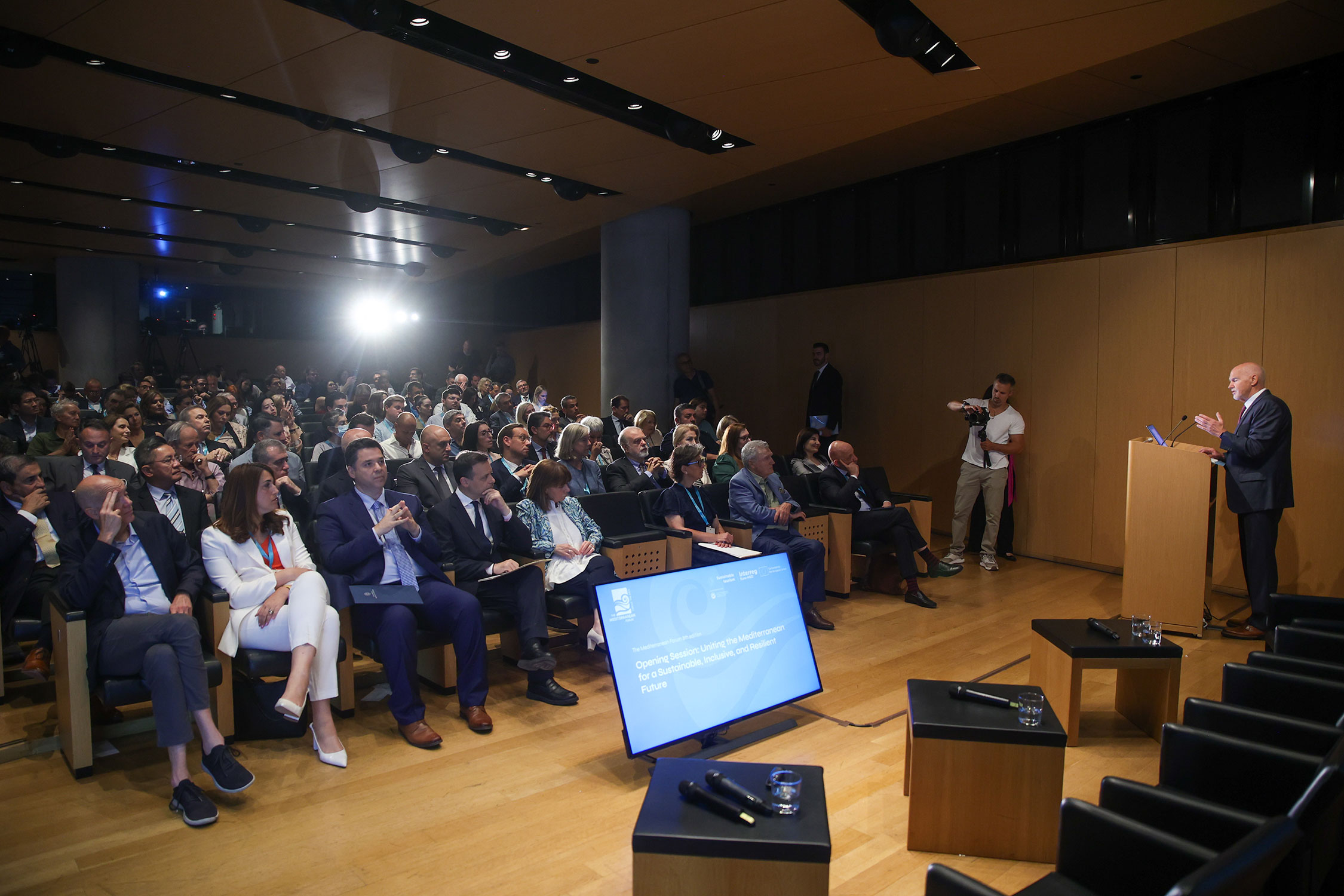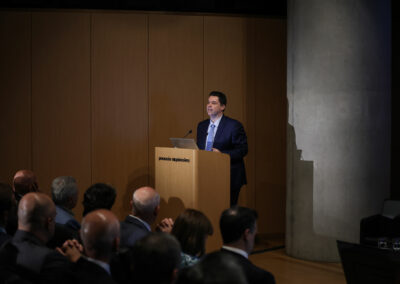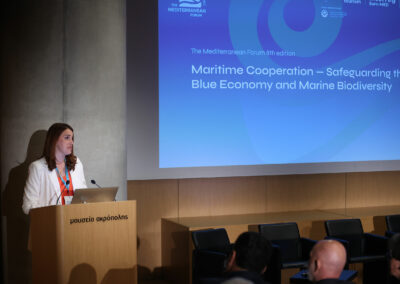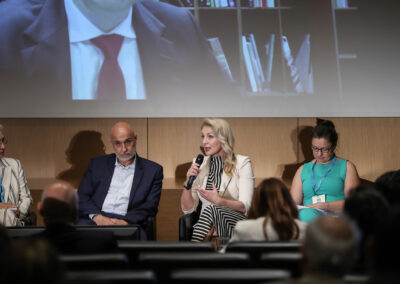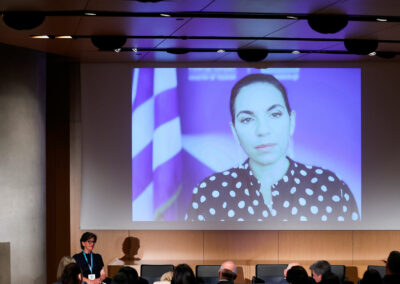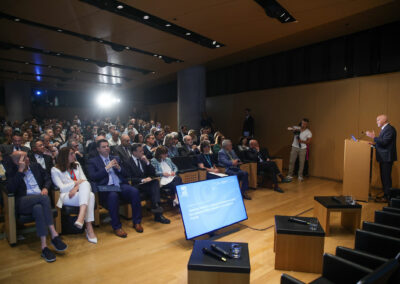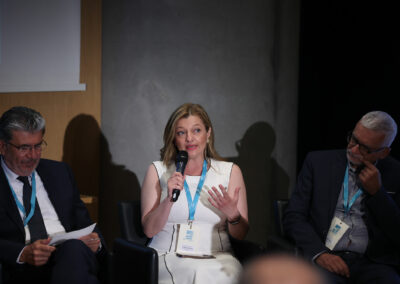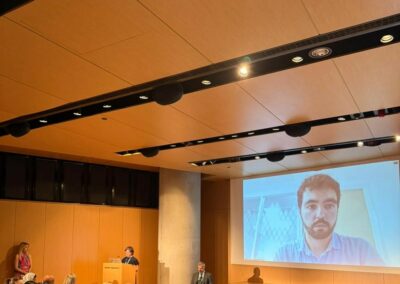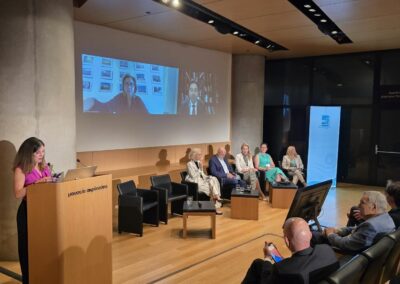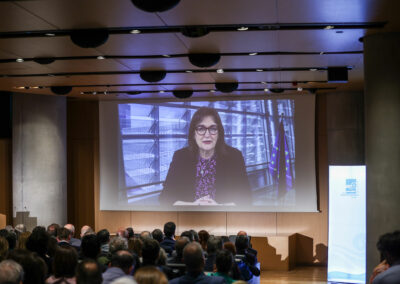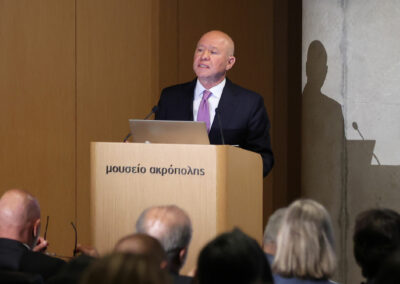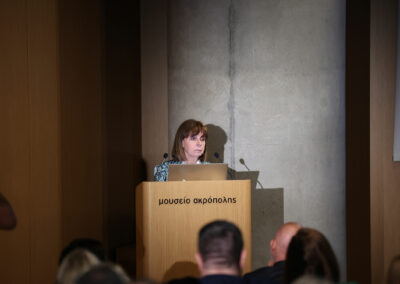On Wednesday, 4 June, the second day of the 8th Edition of Circle the Med – The Mediterranean Forum brought the spotlight to a cornerstone of the Mediterranean identity: Tourism. Held under the auspices of the Sustainable Tourism Mission of Interreg Euro-MED, and hosted at the iconic New Acropolis Museum, the day unfolded with a packed amphitheatre, dynamic exchanges, and high-level policy discussions.
In a region where the climate crisis is reshaping priorities and practices, tourism has emerged not only as an economic driver but as a strategic axis for green transition, digital innovation, and regional cooperation. The Forum demonstrated that tourism policy today must reflect a balance between growth, environmental protection, cultural identity, and social cohesion. The discussions focused on environmental policies and the new European (European Agenda for Tourism 2030) and global (UNFCCC COP 29) fully binding rules, which highlighted the necessity of achieving a sustainable and resilient model of tourism.
Throughout the day, the sessions—supported by the Cross Network Alliance of the Dialogue4Tourism Interreg Euro-MED project—highlighted how multi-level cooperation, shared vision, and innovation can position tourism as a powerful tool for regional cohesion and transformation.
Opening Session: Uniting the Mediterranean
The day began with a high-level opening session titled “Uniting the Mediterranean for a Sustainable, Inclusive, and Resilient Future”. Distinguished speakers set the tone for the day, including George Papandreou, Former Prime Minister of Greece and President of Circle the Med, Haris Doukas, Mayor of Athens, and Athanasios Kontogeorgis, Deputy Minister to the Prime Minister of Greece. A video message from European Commissioner Dubravka Šuica and remarks from Katerina Sakellaropoulou, Former President of the Hellenic Republic, underlined the urgency of positioning tourism as a lever for sustainable development, cross-border cooperation, and social cohesion across the region. The session was moderated by Alexia Spyridonidou, Climate Governance Specialist at EPLO.
Session: Building Inclusive Green and Digital Economies
Moderated again by Alexia Spyridonidou, the next session, “Building Inclusive Green and Digital Economies — Innovation for a Thriving Mediterranean Future”, explored the integration of digital and green strategies to bridge regional disparities. A keynote address by Levent Çakıroğlu, CEO of Koç Holding A.Ş., emphasized the private sector’s role in shaping equitable transitions.
The first sub-panel focused on climate neutrality and digital innovation, featuring notable voices such as Marija Pujo Tadić, Croatia’s Special Advisor on Climate Action, Themis Christophidou of the European Commission, and Vassilis Koutsoumpas, AI Policy Adviser to the Greek Prime Minister’s Office. Antonis Mavropoulos, waste management expert, rounded out the discussion with insights on sustainability systems. In the second sub-panel, the financial foundations of the green transition were addressed by Adonai Herrera-Martínez from the EBRD, Cleopatra Kitti, founder of the Mediterranean Growth Initiative, and Prof. Constantina Kottaridi from the University of Piraeus—underscoring the need for investment in inclusive economic models.
Session: Navigating the Blue Horizon
The session “Navigating the Blue Horizon: Strengthening Maritime Partnerships for a Resilient Mediterranean”, brought the marine dimension of sustainability to the fore. Moderated by Dr. George Dikaios, the panel featured influential leaders including Vassilis Kikilias, Greece’s Minister of Maritime Affairs, Dr. Susan Gardner of UNEP, Dr. Alicia Bugeja of Malta, and Maria Damanaki, former EU Commissioner and ocean policy advocate. The discussion underscored how marine partnerships can strengthen environmental governance, economic resilience, and climate diplomacy. Key sector leaders such as Alexandra Cousteau of Oceans 2050 and Patricia Charlebois of the IMO emphasized the blue economy’s central role in regional development.
Session: Sustainable Tourism for a Resilient Mediterranean
The day’s core session, “Sustainable Tourism – Cultivating a Resilient Mediterranean Ecosystem”, was co-moderated by Axel Rodriguez Garrote (Interreg Euro-MED) and Ioannis Mardikis (EPLO). The panel featured ministers, envoys, and business leaders who tackled how tourism can be harmonized with environmental and digital priorities.
Lina Annab, Jordan’s Minister of Tourism, and Olga Kefalogianni, Greece’s Tourism Minister (via video), emphasized the sector’s power to drive inclusive growth and climate resilience. Dr. Ornela Çuçi and Julia Heiss (UNESCO) stressed the need to integrate environmental science and education into tourism strategies. Experts from business, academia, and government—including George Vernicos, Alexandros Angelopoulos, Dr. Sofia Avgerinou-Kolonia, Simone Bastianoni, Leonor Picão, and Panagiotis Sakelaropoulos—shared practical solutions, from ethical tourism and heritage preservation to regional planning. Bell Cameron (Hellenic American University) closed by underlining civic engagement as key to sustainable tourism leadership.
Closing Session: Charting the Path Forward
In the final session, “Collaborations and Shared Priorities: Shaping the Mediterranean’s Sustainable Future”, diplomats and policymakers mapped the strategic takeaways from the Forum. Moderated by Dr. Harry Tzimitras of PRIO Cyprus Centre, the panel featured ambassadors from Slovenia, Croatia, France, Morocco, and Romania, all reinforcing the Mediterranean’s leadership role in advancing sustainable development goals.
This year’s Circle the Med Forum gathered more than 400 in-person participants from 53 countries, over 1,500 online viewers, and 8,500+ unique website visitors, confirming its role as a premier convening platform for Mediterranean cooperation. As tourism was repositioned not just as an economic sector, but as a catalyst for peace, sustainability, and inclusive growth, the Forum sent a clear message: the Mediterranean can lead the way toward a green, resilient future—if we act together.
Finally, the Circle the Med Forum as a whole significantly advanced the objectives of the Cross Network Alliance of the Sustainable Tourism Mission under the Interreg Euro-MED Programme. By bringing together a diverse spectrum of stakeholders, fostering high-level dialogue, and showcasing best practices, the Forum strengthened advocacy efforts for sustainable tourism, expanded collaborative networks across all levels of governance, and promoted meaningful cooperation to support a greener, more inclusive Mediterranean tourism model.
The Forum’s video recordings will be available soon on this link

